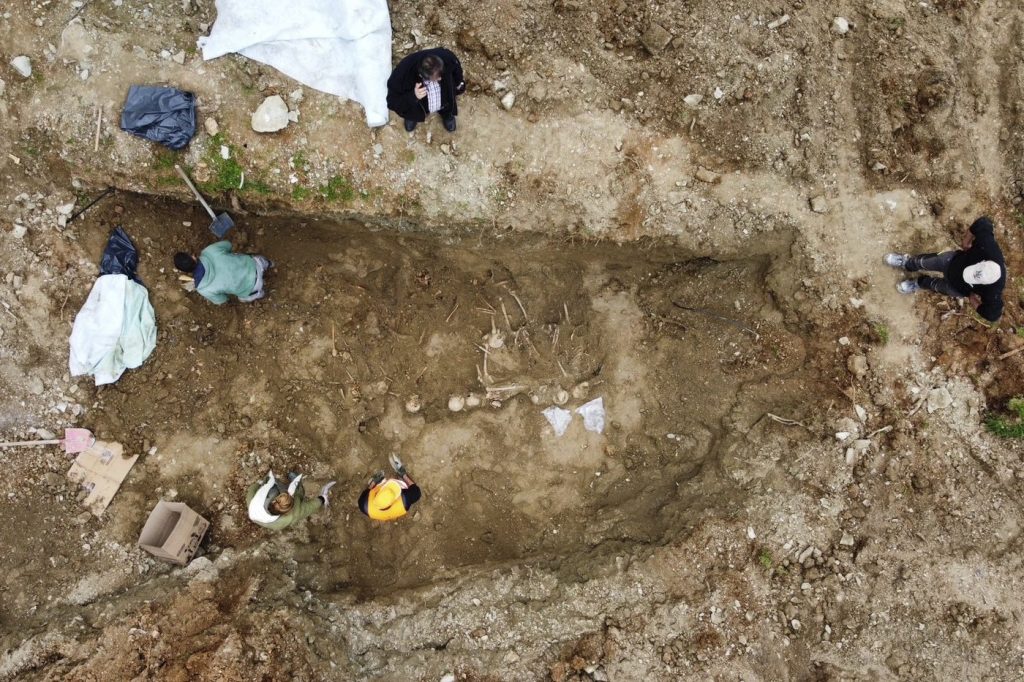THESSALONIKI, Greece (AP) - Workers discovered a mass grave while installing benches at a park in the ancient Greek port city of Thessaloniki. During the excavation, they unearthed a fragile white skull along with two skeletons, and eventually, 33 sets of bones were found clustered in unmarked burial pits near the ancient Byzantine fortress known as Yedi Kule. The supervising engineer, Haris Charismiadis, noted that many of the skulls bore bullet wounds, suggesting a violent history tied to the site.
The Yedi Kule fortress, historically a prison, served as a site for the torture and execution of Communist sympathizers during Greece's Civil War, which took place between 1946 and 1949. This brutal conflict involved Western-backed government forces clashing with leftist insurgents, resulting in the deaths of tens of thousands and a legacy of societal division marked by assassination, child abductions, and mass displacements. The archaeological service initially cleared the site for development, as the bones are less than 100 years old, but local authorities have continued the excavation due to its historical significance.
Families of the deceased have been arriving at the site to pay their respects, leaving flowers and urging authorities to conduct DNA tests to identify the remains of their relatives. The mayor of Neapolis-Sykies, Simos Daniilidis, stated that descendants are eager to retrieve the remains of their grandfathers or uncles, shedding light on personal histories intertwined with the impersonal horrors of the Civil War. Historian accounts estimate that as many as 400 prisoners were executed at Yedi Kule, which serves as a grim reminder of this dark chapter in Greek history.
The excavation in the Park of National Resistance is significant as it marks Greece's first exhumation of a Civil War mass grave. Among the identified victims is Agapios Sachinis, a 19-year-old who faced execution after refusing to renounce his political beliefs. His namesake nephew, who carries his legacy of courage and dignity, hopes to have his uncle’s remains identified and cremated so that he can keep his ashes close. This sentiment resonates with many who view these hidden bodies as symbols of a wartime legacy that has often been buried out of fear of rekindling old animosities.
Greece’s Civil War, arising from the aftermath of World War II, saw U.S. President Harry Truman's anti-communist intervention come to life through the Truman Doctrine, which provided military support to Greece. This period set the stage for decades of repression and conflict, leading to a painful dialogue about how to address past atrocities. While many countries have attempted to confront such historical injustices, fear of division still permeates the discourse surrounding the Civil War in Greece.
Executions, often conducted by military firing squads, continued into the 1950s, with many victims being young adults. Historian Spyros Kouzinopoulos, originally from Thessaloniki, dedicated years to uncovering the ineffable suffering experienced by those imprisoned at Yedi Kule. His research recounts harrowing tales of executions where the condemned were taken in secrecy, highlighting the cruel realities faced by political dissenters.
As city officials initiate DNA testing processes, families of the missing are encouraged to provide genetic material to aid in identification efforts. Agapios Sachinis is among the many eager participants in this project, reflecting the enduring desire for closure in the aftermath of conflict. The mayor has also planned an expansion of the excavation site to uncover more potential burial locations, underscoring the importance of this discovery as a substantial historical and cultural marker.
The unearthing of this mass grave highlights not just a local tragedy, but a broader narrative of struggle, repression, and resilience. It stands as a powerful reminder for the citizens of Thessaloniki—and indeed, all of Greece—of the need to confront their past while promoting a message of never repeating such horrors. As the city grapples with the implications of this discovery, hope exists that these revelations may finally allow families to reclaim their histories and honor the memories of those lost in the conflict.










